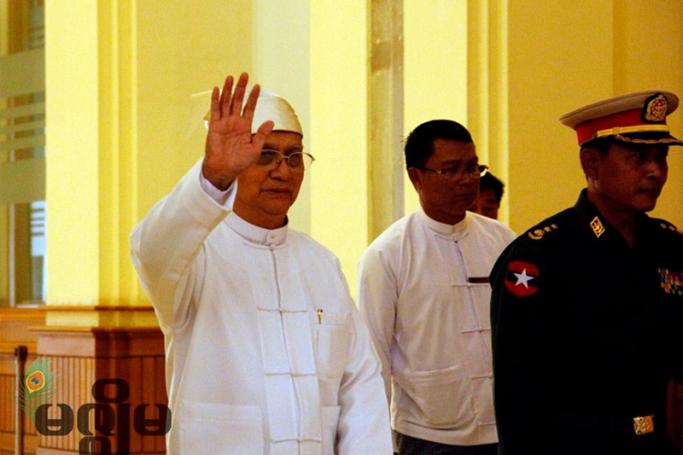President Thein Sein hailed the "triumph" of Myanmar's transition of power Thursday, in a last address to a military-dominated parliament before it makes way for a historic new legislature led by Aung San Suu Kyi's pro-democracy party.
The Southeast Asian nation, choked for decades under junta rule, is on the cusp of a remarkable political transition after Suu Kyi's National League for Democracy (NLD) thundered to victory in November elections.
Myanmar's people are hoping her government can reboot a country eviscerated by army rule that battered the economy and repressed dissent.
"Even though there were difficulties and challenges, we were able to bring a democratic transformation eventually," Thein Sein said addressing the military-stacked legislature for the last time.
"This is a triumph for all Myanmar's people," he added.
"As everyone knows, for over five decades we were far away from a multi-party democratic system," he said.
Thein Sein, who under drawn-out handover rules retains his post until the end of March, has been a key player in Myanmar's astonishing reform process so far.
He was among a host of military figures who shed their uniforms to form a government in 2011.
Initially that government was viewed with suspicion as a civilian front for the army's continued domination of the country from behind the scenes.
While the army retains major clout -- a quarter of parliamentary seats are ringfenced for unelected soldiers -- sweeping political and economic reforms since 2011 have surprised the international community and encouraged a flood of foreign investment.
They also culminated in November's polls which passed peacefully and fairly and saw Suu Kyi's party scoop nearly 80 percent of elected seats in the national parliament.
-'Better foundation?'-
Suu Kyi, 70, now has the weight of the nation's expectations on her shoulders, after a decades long struggle against junta repression.
Observers say the former political prisoner is seeking to find ways to placate a twitchy military, which maintains huge political and economic sway.
The Nobel laureate faces a formidable challenge in an impoverished nation, blighted by corruption and torn by ethnicminority civil wars and religious divisions.
She is barred from the presidency by the junta-era constitution that many believe was designed specifically to exclude her, but has vowed to rule through a proxy, who is yet to be named in public.
The new NLD MPs, many of whom are political novices from a diverse range of professions, will take their seats on February 1 following the final day of a lame duck session by the outgoing parliament on Friday.
Thein Sein's party was all but annihilated in the legislature, but the outgoing leader said he had not launched the reforms in order to hold on to power.
"During the last five years we have built a better foundation for the next government, who won the 2015 election. I did not do this with the expectation of being a second term president," he said.
He listed a fragile peace process, better access to health care and education and greater freedom of information as his main reforms.
Both he and powerful army chief Min Aung Hlaing have pledged to support the transition towards democracy in the face of Suu Kyi's popular mandate.
A flurry of political plays have dominated the days leading up to the handover, leaving analysts struggling to decipher their meaning in a country where decision-making has long been made in secret.
© 1994-2016 Agence France-Presse
You are viewing the old site.
Please update your bookmark to https://eng.mizzima.com.
Mizzima Weekly Magazine Issue...
14 December 2023
New UK Burma sanctions welcome...
13 December 2023
Spring Revolution Daily News f...
13 December 2023
Spring Revolution Daily News f...
12 December 2023
Spring Revolution Daily News f...
11 December 2023
Spring Revolution Daily News f...
08 December 2023
Spring Revolution Daily News f...
07 December 2023
Diaspora journalists increasin...
07 December 2023
UNHCR chief appeals to Myanmar government to help IDPs, refugees












